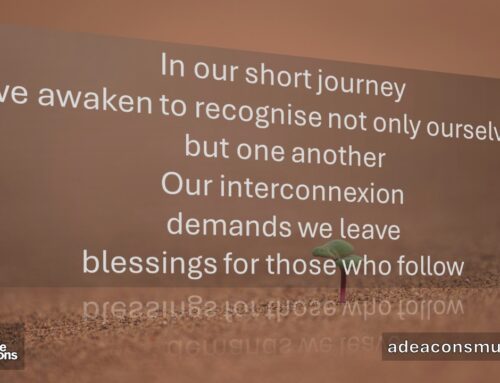Relevant is a hard word for the church …
I often hear, from those seeking or simply rejecting organised religion, that the church is no longer, if ever it was, relevant in their lives. On the other hand, as if that is not challenging enough, when I work and walk with congregations asking questions about purpose, mission and their role beyond their walls, there is lament about how to be relevant. At the very least, both this challenge and grief help us navigate where the two might meet …
For those for whom the institution does not seem pertinent – well, we’re not even on their radar. And – if we are – often the first place we might be a blip is in the realm of social media and – particularly – around topics of social justice and prayer/mediation/centring. For those for whom the question of relevance is a concern, often how to respond requires a shift to realise that the world that has been our normal in many ways no longer exists.
Even in these connexions and differences, I believe the tricky part is the word itself: relevant. The initial or historic meaning of the word comes from a Scottish legal reference to that which is ‘legally pertinent.’ I think this is helpful as a way to ask what is the intention, as opposed to the definition, of the word we are using? What do we mean when we use the word ‘relevant?’
In our consumer based culture, this legal terminology seems telling. As such, here are a few ways we might frame the word in this legal and consumer context:
- How can you give/convince me what I want?
- What do you have that I want?
- What do you have to say to me that allows me to hear what I want to hear/expect to hear?
- How do I make sure what I am offering sounds like something you want?
- How do I sell you something I have, which you may not yet know you want?
And – if any of these questions fit – a contract is established, a sale is made and both parties are happy … except in our consumer culture this is always temporary. The product is – ultimately – simply the means by which we perpetually consume.
As a people of faith, with millennia of spiritual practice, we have to acknowledge this is quite different than what we likely mean by being ‘relevant.’ As Christians, we have to realise this is not Good News … this is not a temporary product, but a way of life that invites people to embrace and live love, in order to bear light into shadowed places …
As I paused and mused about this tension, I discovered a set several of synonyms, which caught my attention. These alternatives for the term ‘relevant’ seem to create a bridge that connects those seeking and those sharing. Words that might describe a space where those who find something is missing and those who think they have one way to bring meaning, might meet.
- What might it mean, if we substitute relevant for related? Instead of asking how are you relevant to me, we might ask, how are we related? What binds us?
- What might it mean if we substitute relevant for mutual? Instead of asking what can I get from you to bring me meaning, we ask how we might mutually bring depth to our lives?
- What might it mean, if we substitute relevant for reciprocal? Instead of asking what can I get from you to bring me meaning, we ask how might we reciprocally recognise that in one another we are more than what we are told if we accept that we meant to simply consume in isolation?
I’m not sure what the answers might be, but I have an inkling that the conversations themselves would begin to reveal potential and possibilities worth imagining …









Your reflections are most welcome!